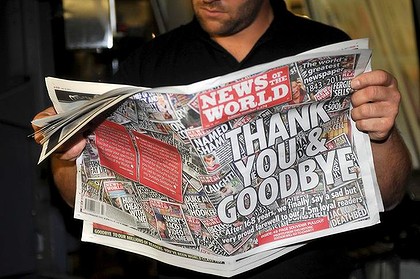|
Opinion
 |
|
An employee looks at a copy of the final
edition of British tabloid the News of the World. Photo:
Reuters |
THIS year I am giving an award for the single best line I've read in a
newspaper in the past 12 months. The winner, Allison Pearson, writes for
the British conservative newspaper The Daily Telegraph. Her subject? The
Leveson inquiry on the media.
Earlier this year, I saw firsthand how sections of the Australian media
behaved in relation to a death that became a public matter - what they
got wrong, what they distorted. A woman journalist from a Melbourne
commercial television station appeared inside the house of the bereaved
wife the morning after the fatality, advancing towards her beneath a
mask of make-up in an executive suit saying she would ''like to do a
lovely story on your husband''. To use such a cliche at such a moment is
gross.
The British media and the Australian media operate within the one moral
universe. If the worst of what has happened in Britain - most notably,
the media treatment of the parents of kidnapped toddler Madeleine McCann
- has no parallel in Australia, it doesn't mean it couldn't happen here.
What it comes down to are the cultures of the various media
organisations, to what is deemed acceptable conduct, what is encouraged
and what a blind eye is turned to.
Advertisement: Story continues below
Last month, it was reported that News International's former chief
executive in Britain, Rebekah Brooks, was expecting a baby by a
surrogate mother. Initially, the surrogate mother was carrying twins but
it was reported that one of the embryos had died. In the Telegraph,
Pearson outlined what Ms Brooks could expect if she was given the News
of the World treatment.
The hounds, wrote Pearson, would be unleashed ''to track down the
surrogate mother and harass the poor woman for mawkish details about the
dead baby (boy or girl?). Information could be obtained by hacking
Rebekah's phone … Rebekah would be invited - nicely - to confirm the
story and then warned - not nicely - to expect something far worse if
she didn't co-operate … Meanwhile, hacks would find the fertility clinic
and 'encourage' members of staff to divulge private medical details …
Then, conveniently, a 'friend' of Rebekah's would confide to a
journalist that a randomly chosen soap star was 'the baby's donor
father'. Easy, isn't it? … Anyone with a lively imagination and no moral
sense can have a go.''
In one respect, I disagree. I don't believe it takes a lively
imagination. It's a racket and, as with all rackets, all you have to do
is learn how it works.
No one, it seems, has been treated more abysmally by the British media
than the McCanns. Earlier this week, wrote Pearson, Gerry McCann
explained to ''an astonished inquiry that he and his wife, Kate, had to
take legal action against a paper which said they had 'sold Maddie into
white slavery' to solve financial difficulties! Then there was the News
of the World executive who promised to publish a positive piece to mark
the first anniversary of Madeleine's abduction and instead ran pages
from Kate's anguished, personal diaries, without her permission, after
apparently obtaining them from the Portuguese police.''
Then came the single best line of 2011: '' 'Is there a journalist's
byline on that article?' thundered Lord Justice Leveson, who is starting
to wear the aghast look of a missionary observing his first Aztec
sacrifice.''
Nowadays, nobody thinks Aztec sacrifices were just something that
happened between the Aztec priests and the victims whose hearts they cut
out. Our idea of Aztec sacrifices extends to the crowds who stood and
stared, who drank it up as a spectacle, who either believed they
couldn't stop it or didn't care and are thus remembered as being part of
the barbaric practice.
Martin Flanagan is a senior writer. |


